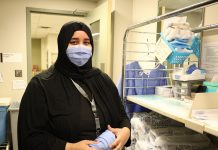
Mental health crisis calls made to 911 police dispatches across the country have been increasing in recent decades, most recently during the pandemic. Peterborough police now have three Mobile Crisis Intervention Teams in place in the communities of Peterborough, Lakefield, and Cavan-Monaghan Township to respond to these calls and help get people the support they need.
Two of the teams are a partnership between the Peterborough Police Service and the Canadian Mental Health Association Haliburton, Kawartha, Pine Ridge (CMHA HKPR) and the third is a partnership with Peterborough Regional Health Centre (PRHC).
In each team, a mental health worker, nurse, or social worker is partnered with a police officer to respond to mental health crisis incidents and to follow up on cases where mental health or social services may help.
“As a service we have been working extremely hard with our community partners to put the funding and people in place,” says Peterborough police inspector Jamie Hartnett in a media release. “The service understands and believes in the success these partnerships can have for our community. They are making a difference.”
The origins of the first Mobile Crisis Intervention Team go back to 2011, when a CMHA HKPR outreach worker began working out of the Peterborough police station. The outreach worker rode along with police officers, attending mental health calls and following up on the calls. The Mobile Crisis Intervention Team was born in 2018 when a police officer was added to the unit.
In 2021, Peterborough police responded to 805 calls related to mental health — an increase of 46 per cent from 2018 — with the Mobile Crisis Intervention Team attending or following up on 574 of these calls. Despite the increase in the number of calls, there has been a 37 per cent decrease in apprehensions and arrests under the Mental Health Act over 2020.
The second Mobile Crisis Intervention Team partnership with CMHA HKPR was supported by surplus funds re-allocated by the City of Peterborough in the Peterborough Police Service’s 2021 budget. Funding for the partnership with PRHC, which began last November, is funded by a provincial grant until March 31.
“Partnerships like these are absolutely vital, and we are so pleased to be working closely with Peterborough Police Service and CMHA HKPR to provide community-based care, when and where it is needed, for people who are experiencing a mental health crisis,” says PRHC vice-president Sean Martin. “Among many other important benefits, the Mobile Crisis Intervention Team model has been shown to reduce the number of patient visits to the hospital’s emergency department and crisis response unit.”
CMHA HKPR also participates in Mobile Crisis Intervention Teams with Ontario Provincial Police detachments in Peterborough, the City of Kawartha Lakes, and Haliburton County, in addition to its teams with the Peterborough Police Service.
“We are extremely grateful for the partnership with Peterborough Police Services over the past 12 years through the Mobile Crisis Intervention Team,” says CMHA HKPR‘s CEO Mark Graham. “This model has proven successful and we are excited that the team is expanding to include more skilled community partners, like PRHC.”


























